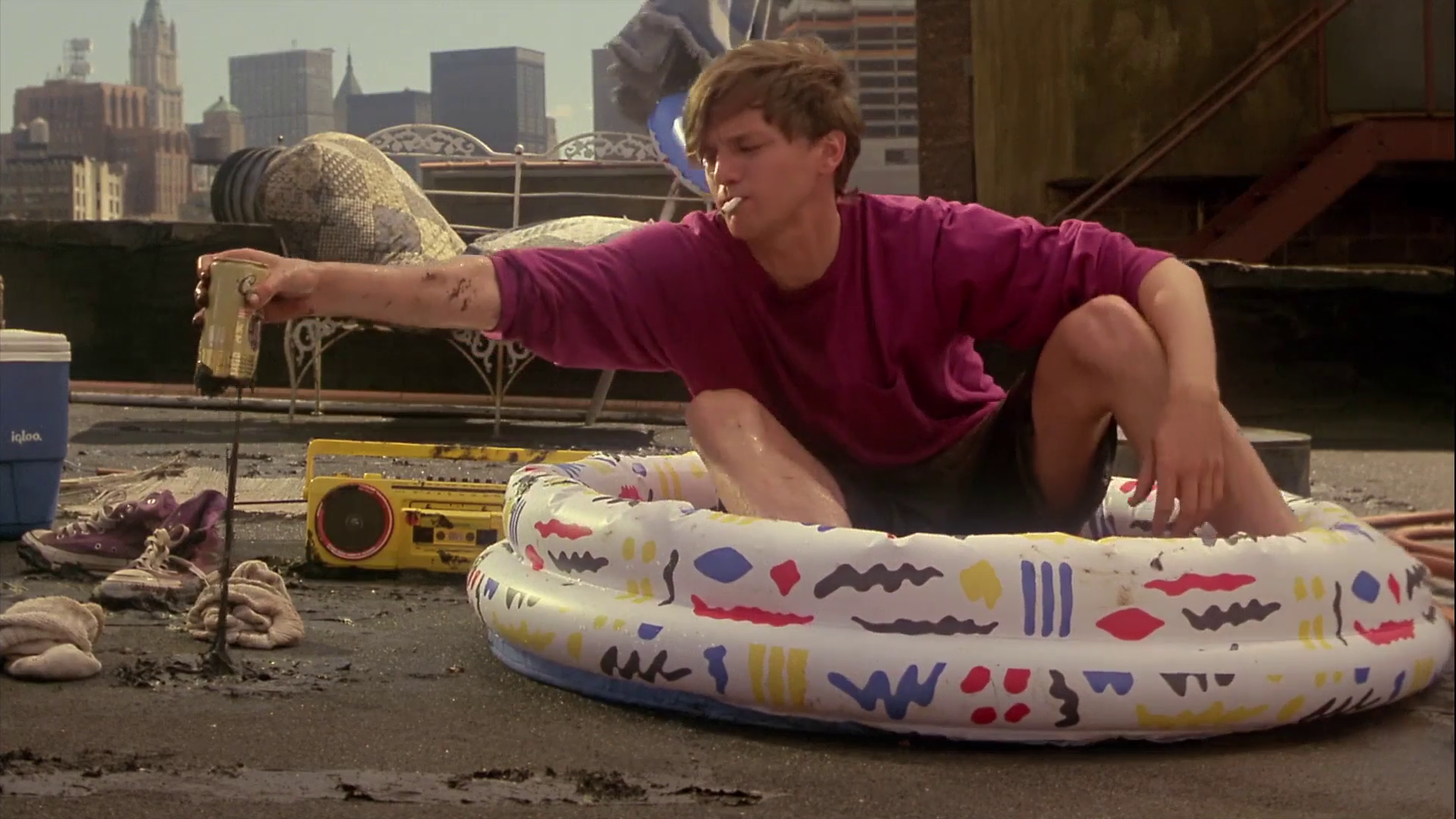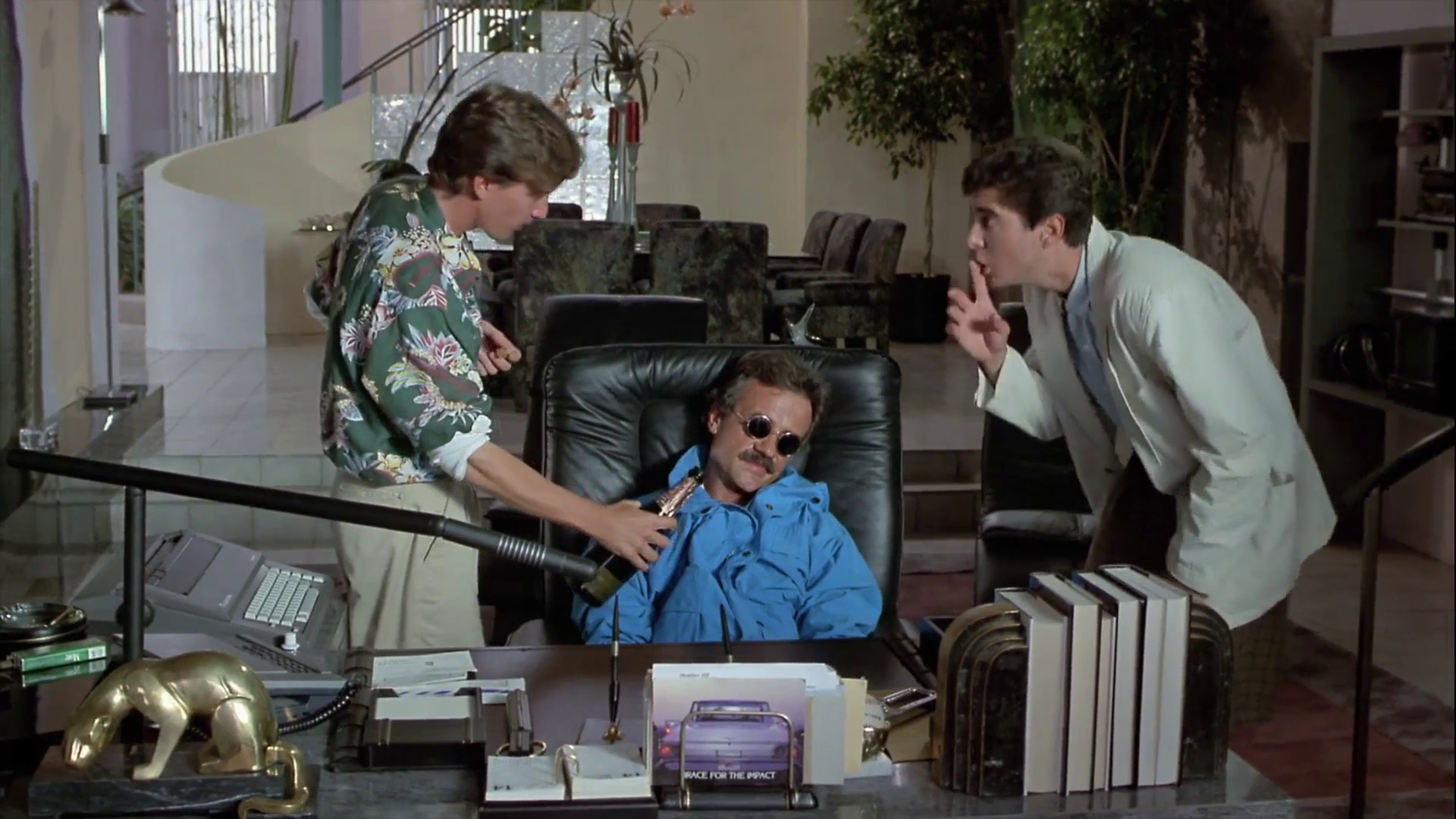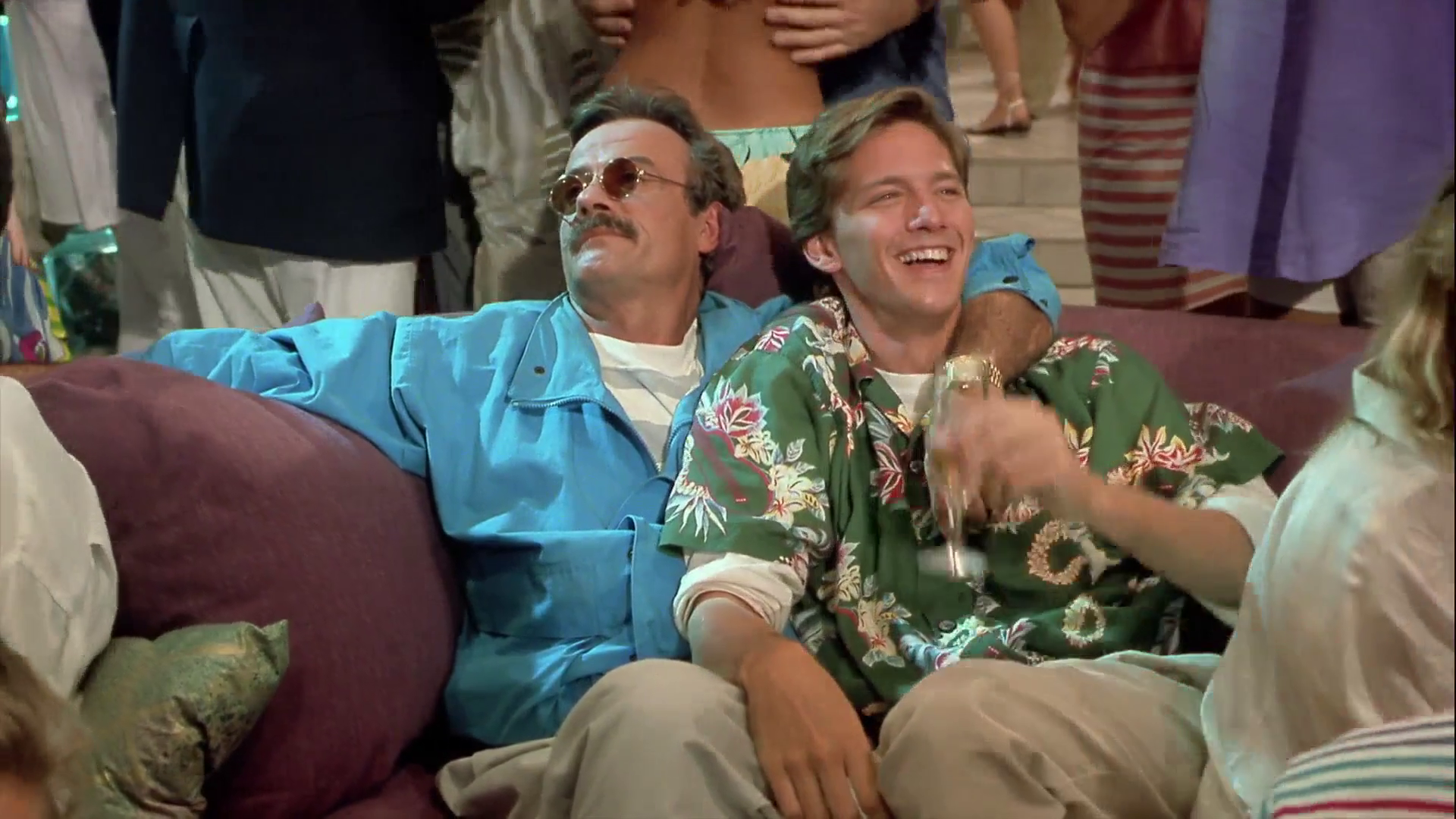Beneath the cobbles lie the Hamptons: violence and aesthetics in Weekend at Bernie’s (1989)

During May ‘68, 50 years ago this past month, Paris students took to the streets, literally. Under the slogan “Sous les pavés, la plage!” (“Beneath the cobbles, the beach!”), protesters tore loose the stones that made up the streets of the Quartier Latin in Paris, so as to gain ammunition against the gendarmes. But this was not only an anticapitalist battlecry. At the same time, it was an affirmation of one of capitalism’s driving forces: the desire for leisure and luxury, the ‘beach’ waiting at the end of their struggles. While not an activist film, the 1989 comedy Weekend at Bernie’s (directed by Ted Kotcheff, written by Robert Klane) also represents an attempt to get to the beach, the luxury summer estates of The Hamptons, New York. And like the ‘68ers, the film’s protagonists are youths violently and aesthetically seeking to liberate themselves from the yoke of capitalism: by deploying the dead body of their boss as an object to be manipulated in a performance of the nouveaux riche lifestyle.
No more real beaches
The film opens on a particularly hot Sunday, with Richard (played by Jonathan Silverman) leaving his apartment to go to work. Along the way, he meets up with his friend and colleague Larry (Andrew McCarthy). Their sorry situation is clear: being consigned to work on the weekend, on one of the sunniest and warmest days of the year, Larry and Richard are slaves to their work with no hope of escape: “We’re gonna be here our whole lives”, laments Larry, “Yep, I’m afraid so” responds Richard, cynically.
Richard’s cynicism doesn’t impress Larry, who now takes matters in his own hands: “Let’s go to the beach!” he proposes. And when Richard is reluctant, Larry snatches whatever Richard is working on and runs away. “These papers are going to the beach!” We cut to a shot of Larry and Richard sitting down in reclining beach chairs, with Larry debating whether he can go in the water. The camera then cuts to reveal that the two are not actually on the beach, but rather on the office rooftop, lined with tar slowly melting in the sun and with a pathetic little kiddies’ pool functioning as a surrogate for the ocean.
The rooftop scene foreshadows the rest of the film. Its slapstick comedy is prefigured in Richard and Larry trying (and failing) to navigate the sticky, tarred roof, while their initial motivations are disclosed through a contemplation of their existential condition:
Larry (sitting down in the kiddies’ pool): “This sucks, I am so unhappy! We should be at a real beach.”
Richard (still on a recliner): “There are no more real beaches. I mean, we can go to Jones Beach and float around in the hospital waste. Then again, Coney Island is always real nice. We can go there and watch the fish disintegrate in front of our eyes.”
The hospital waste is a reference to the infamous Syringe Tide that plagued New York in ‘87 and ‘88, during which hospital waste originating from NYC’s Fresh Kills Landfill kept washing up on shores in and around the city. The landfill provided space (but not enough) to all of NYC’s residential waste, 29,000 tons per day at its peak in ‘86. The two beaches mentioned by Richard are (mostly) open to the general public and conveniently reachable for the typical NYC citizen. This is why there are no more real beaches, not for the people at least: because they are already knee-deep in a tide of their own waste.
A possibility of escaping their condition opens up as Richard uncovers a case of insurance fraud. Someone has stolen 2 million dollars from the company and Richard and Larry are the ones to discover the theft. Surely, this will ingratiate them with the company’s CEO, Bernie Lomax?

The two meet with Bernie the next day and they manage to convince him that there is indeed something wrong with the company’s books. Bernie suggest that the next step is to go over the numbers in detail to make absolutely sure they have damning evidence of fraud: Richard and Larry will have to work another weekend. He is grateful, however, for their efforts and, say, isn’t it Labor Day Weekend coming up? How would the two of them feel about joining Bernie at his estate in The Hamptons for the weekend?
Bernie: “You’ll love it! When we’re not working, there are plenty of distractions: women, swimming, boating, famous people… Well?”
Thus, the holiday celebrating the American labor movement (first Monday in September, not to be confused with Labour Day, on the first of May) marks the fulfilment of the American Dream for Richard and Larry. Or at least the ’80s understanding of the American Dream, suffused with a neoliberal obsession with fame, an alienated understanding of work, and terrible gender politics to boot. In a word: the real beach that they’ve been yearning for.
All this could be yours…
The duo arrives at Bernie’s estate with mouths ajar. They admire not only the sheer size of the house and the fact that it’s got a pool, but also the signs of a cultural class to wich they don’t belong: a Lichtenstein piano and a Steinway painting, or was that the other way around?
Richard: “All this could be yours, Lar, if you set your goals and work hard.”
Larry: “My old man worked hard and all they did was give him more work!”
While Larry takes the liberty of opening a bottle of champagne, Richard wonders where their host is supposed to be. They resolve to explore more of the house and eventually discover Bernie in his office, slumped in his chair.

After some messing around with Bernie’s body, transferring him to the couch to ‘get his circulation going’, Richard discovers a needle and a plastic baggie of white stuff in Bernie’s pocket. He checks his pulse, puts two and two together and concludes that Bernie is dead, overdosed on his own stuff. Larry is devastated:
Larry: “Why do these things always happen to me? What kind of a host invites you to his house for the weekend and dies on you?”
Richard: “Why would he do this? I mean, he had everything: a house, cars, women. This is tragic.”
Larry (moved to tears): “I don’t understand why he couldn’t wait until Monday to kill himself.” […] “You know, I told everyone at the office we were going out to Bernie’s house for the weekend and they were so jealous. I mean, I loved it… Now what am I going to tell them?”
There is something very theatrical and exaggerated about McCarthy’s acting throughout the film but especially in this scene. One can really imagine him breaking into a soliloquy at this point, were it not for the fact that he is interrupted by the sound of other people approaching: party-goers ready to have a good time at Bernie’s. Larry quickly puts the drugs back in Bernie’s pocket and moves over to Richard as both prepare for the worst.
In a scene basically illustrating alienated social life, it becomes clear that nobody cares, or rather even notices that Bernie is actually dead. At that moment, Larry sees an opportunity to have it all, not through ‘hard work’ like his dad, but rather through an act of aesthetic violence: they’re going to pretend that Bernie is still alive.
To give off the impression that a dead body is alive and you are friends with it, you mustn’t only refuse to acknowledge the truth. You must also use the dead body as you would a puppet: move it around while kicking his legs, so as to give off the faint impression that you are walking together in friendly embrace. When necessary, you must bind it in an elaborate contraption that allows you to pull a cord to wave its arm around. And, of course, when you need it to disappear fast, you must chuck it over the balcony with reckless abandon. To Richard and Larry, this is their one way to live the Dream: not by sucking up to their boss, trying to become friends with him, but by performing the friendship aesthetically.

Such use of violence for aesthetic means might shock people, rather than have the intended comedic effect. To the audience, the violence must therefore be justified by showing that, unbeknownst to our protagonists, Bernie did not die of an overdose at all, but rather was killed by the Mafia in a deal that turned sour (a deal, by the way, that should have involved the execution Richard and Larry, because they were the ones to uncover the operation in the first place). To the audience, then, (and not to the film’s credit) the violent aesthetic play is lazily justified by pointing to violence already present within capitalism: ’they started it!’
Redeeming violence?
In a series of increasingly absurd, and increasingly violent scenes, Larry and Richard turn against their boss in an effort to perform the kind of lifestyle they desire, if but for a weekend. However, the wish to exercise complete control over one’s life itself amounts to merely another form of slavery. This is why Larry and Richard find themselves having to perform their liberation aesthetically, because anything else would amount to a surrender to the very system they are seeking to escape. Consider the unlikely scenario in which Larry and Richard would have succeeded in convincing everybody that Bernie was alive and well, that they are his new best friends and they now have the beach permanently available to them. Undoubtedly, they would become precisely the type of alienated person who is a slave to his/her own high society circle, the type that couldn’t tell a dead body from a live one in the first place.
There is a way of seeing May ‘68 as a kind of point of reference for leftist politics today. E.g. it is often pointed out that it was not just the students that took to the streets, ‘68 was rather a broad movement that cut across societal strata. If we could only tap into that same energy, the revolution would be a lot easier, or so the thought goes. In so thinking, one inevitably runs up against the students’ frivolous use of violence. Slogans such as the one that inspired the title of this review, speak to a conception of politics as a kind of aesthetic performance, the kind Walter Benjamin famously declared fascist. On such a reading of things, the only violence justified is the one that reacts to an already violent system (“they started it”). Contrary to such a banal form of radicalism, the bravery of Weekend at Bernie’s lies in raising the question, pace Benjamin, to what extent violence can be performed aesthetically, before it becomes fascist.